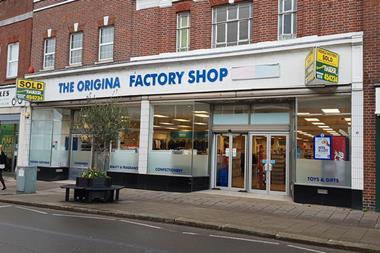It's no longer a question of if or when, now the cat's out the bag, the only question seems who. Assuming it can't be carved up (very hard to do), who would buy Somerfield, with its £4.6bn sales and its 908-strong portfolio of c-stores, forecourts and supermarkets? Along with private equity players, I'm going to dismiss two multiples out of hand: Tesco, for competition reasons, and Morrisons, which has only just digested Safeway. However impressive its recent performance under CEO Marc Bolland appears, its turnaround, still in its infancy, could be easily distracted by a sizeable distraction like this. The obvious favourite is Asda. Until last year CEO Andy Bond dismissed the idea of smaller store formats, arguing it would take 50 c-stores to make as much profit as a single superstore. But he has changed his tune to "maybe". In the medium-sized format, too - where Somerfield has 650+ supermarkets - Asda hasn't given up on Essentials. In its revised iteration the Pontefract store is working well, says Bond. With Wal-Mart's cash, Somerfield and Asda could be a serious thorn in the side of Tesco. Mitigating against that, it continues to search exclusively, property-wise, for stores above 25,000 sq ft. And the loss of COO Dave Cheesewright to Wal-Mart in Canada suggests it would be tough to execute short-term. Sainsbury's, too, has its work cut out right now, with pressure to improve efficiency and margins. On the other hand, the addition of small and medium-format stores would leave it with more room to devote to non food in its superstores and hypermarkets. I shouldn't forget Waitrose and M&S. Price and position-wise, these are increasingly close to Somerfield. But while Freeman's provisional findings left the door ajar for a sale, timing-wise, I don't get it.
Close menu
- Home
- Retail & Wholesale
-
Products & Suppliers
- Back to parent navigation item
- Products & Suppliers
-
Product Categories:
- Back to parent navigation item
- Product Categories:
- Alcoholic drinks
- Bakery
- Cereals & breakfast
- Cheese
- Chicken & poultry
- Chocolate
- Confectionery
- Crisps, nuts & snacks
- Dairy
- Fish
- Fresh produce
- Frozen
- Household
- Meat
- Own Label
- Sauces & condiments
- Seasonal
- Soft drinks
- Vaping
- Vegan & plant-based
- World foods
- Suppliers
- People
- Reports & Data
-
Topics A-Z
- Back to parent navigation item
- Topics A-Z
-
Popular topics:
- Back to parent navigation item
- Popular topics:
- Cost of living crisis
- Crime
- Deposit Return Schemes
- Finance
- Government & Regulation
- Health
- Inflation
- Loyalty
- Marketing
- Mergers & Acquisitions
- New Product Development
- Sourcing
- Supply chain
- Sustainability & environment
- Technology
- Ultra Processed Foods
- Vaping
- A-Z all topics
- Content by type:
- Events
- Ask iA (beta)
- Subscribe now
Opinion - "Who will buy Somerfield? Asda's Andy Bond dismissed smaller format stores but he is reviewing the situation"
2008-01-21T00:00:00+00:00
Sign in to comment on this article
Not logged in before? Register for FREE guest access today.
You will be able to:
- Read more stories
- Receive daily newsletters
- Comment on stories
Advert
















No comments yet